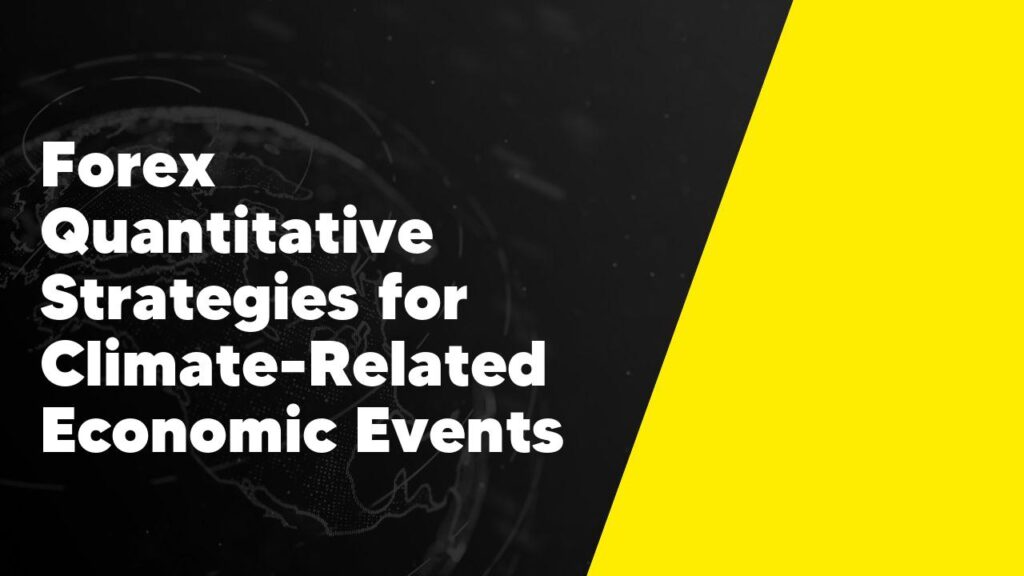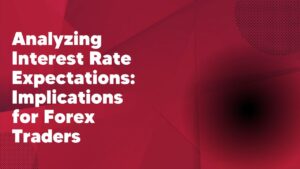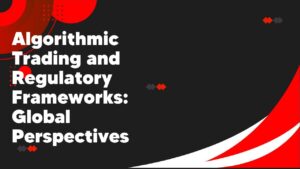Quantitative strategies in foreign exchange (forex) trading have gained significant popularity in recent years, with investors looking for more systematic approaches to analyze and predict currency movements. However, the impact of climate-related economic events on forex markets has been relatively understudied. As the effects of climate change become more tangible and pronounced, it is crucial for traders and investors to understand how these events can impact the forex market and develop effective strategies to navigate such volatility. This paper aims to examine the relationship between climate-related economic events and forex markets, and propose quantitative strategies that can be used to capitalize on these opportunities. By leveraging historical weather data, economic indicators, and market trends, these strategies can help traders make more informed decisions and potentially increase profitability. Ultimately, this research will contribute to a better understanding of the implications of climate change on global financial markets and provide valuable insights for forex traders and investors.
Introduction to Forex Quantitative Strategies
Forex quantitative strategies are a key component of successful trading in the foreign exchange market. These strategies utilize mathematical and statistical models to analyze market data and make trading decisions. By using quantitative analysis, traders can gain a deeper understanding of market trends and patterns, which enables them to make more informed and accurate trading decisions. One popular quantitative strategy is algorithmic trading, where computers analyze large amounts of data in real-time to execute trades at optimal prices and speeds. Another common strategy is statistical arbitrage, which involves identifying and exploiting pricing inefficiencies between related currency pairs. These strategies can be highly effective in generating consistent profits, as they take emotions and biases out of the trading process and rely solely on data-driven decisions. However, it is important for traders to be aware of the risks involved in utilizing quantitative strategies, as no system is foolproof and past performance may not guarantee future results. Overall, understanding and implementing quantitative strategies can give traders a competitive edge in the Forex market and increase their chances of success.
Understanding Climate-Related Economic Events
Climate-related economic events refer to any significant changes or disruptions in the economic sector that are directly influenced by climate change and its associated impacts. These events encompass a wide range of environmental, social, and economic factors, including extreme weather events, physical risks, transition risks, and policy responses.
Extreme weather events, such as hurricanes, storms, and floods, can cause substantial damage to infrastructure, affecting industries like agriculture, transportation, and tourism. The associated costs of recovery and rebuilding can have significant impacts on local and regional economies. Physical risks refer to the direct effects of climate change, such as rising sea levels, temperature increases, and natural resource scarcity. These risks can lead to reduced productivity and increased costs for businesses, particularly those in vulnerable sectors such as energy, water, and food production.
Transition risks arise from the shift towards a low-carbon economy and the increasing implementation of climate policies and regulations. This transition includes the phasing out of fossil fuels, a shift towards renewable energy sources, and the adoption of sustainable business practices. While these actions are necessary to mitigate climate change, they can also create challenges for industries that rely heavily on carbon-intensive practices.
Policy responses to climate change, such as carbon pricing and emissions regulations, can also have profound economic implications. These policies can incentivize businesses to reduce their carbon footprint and invest in sustainable technologies. However, they can also create uncertainties and additional compliance costs, particularly for smaller firms. Understanding these climate-related economic events is crucial for businesses and investors to effectively assess their risks and opportunities, adapt to changing market conditions, and contribute to sustainable development.
Importance of Quantitative Analysis in Forex
Quantitative analysis plays a crucial role in the Forex market, providing traders with valuable insights and helping them make informed decisions. By using mathematical and statistical models, it enables traders to analyze historical data and identify patterns and trends in currency prices. This analysis helps them determine the probability of price movements and potential market direction. Additionally, quantitative analysis allows traders to develop trading strategies based on objective data rather than emotional impulses. It also helps them manage risks by calculating the optimal position size and setting stop-loss levels. Furthermore, quantitative analysis helps traders backtest their strategies by applying them to historical data and evaluating their performance. With the help of quantitative analysis, traders can better understand the market dynamics, make more accurate predictions, and improve their overall trading results.
Implementing Quantitative Strategies for Climate Events
In recent years, the impact of climate events on financial markets has become increasingly evident. As extreme weather events such as hurricanes, floods, and droughts become more frequent and intense, businesses and investors are being forced to reassess their strategies. In response to this growing challenge, many forex traders and financial institutions are turning to quantitative strategies to better predict and manage the risks associated with climate events. These strategies involve the use of mathematical models and statistical analysis to identify patterns and correlations between climate data and market movements. By incorporating weather data into their trading algorithms, traders can make more informed decisions and potentially profit from climate-related fluctuations in asset prices. Moreover, quantitative strategies can help investors hedge against climate-related risks by diversifying their portfolios and taking advantage of short-term opportunities arising from weather-related disruptions. As the urgency to address climate change increases, implementing quantitative strategies for climate events will likely become a crucial tool for forex traders and financial institutions looking to navigate the complex and uncertain landscape of the future.
Factors Affecting Forex during Climate Events
During climate events, several factors can have an impact on the foreign exchange market. One significant factor is the effect of extreme weather conditions on the economies of countries involved in Forex trading. Natural disasters such as hurricanes, floods, or droughts can disrupt the normal functioning of businesses, infrastructure, and supply chains, leading to economic instability. This instability can cause fluctuations in currency values as investors assess the potential economic consequences of these events. Another factor to consider is the impact of climate change policies and actions taken by governments. As countries strive to reduce their carbon footprint and transition to sustainable energy sources, there may be changes in regulations, tariffs, and taxes that can directly affect certain industries. These policy shifts can influence investor sentiment and subsequently impact currency values. Additionally, the availability and price of commodities, especially those affected by climate events, can also influence Forex markets. For example, disruptions in the production of agricultural commodities due to extreme weather conditions can lead to higher prices and affect currency values of countries heavily reliant on these exports. Lastly, climate events can also result in increased volatility in energy markets, particularly oil and gas. Fluctuations in energy prices can have a significant impact on currencies of both producing and consuming nations, as energy is a crucial component of most economies.
Forecasting Economic Trends with Quantitative Analysis
As an experienced content writer in the Forex industry, I understand the importance of forecasting economic trends with quantitative analysis. Quantitative analysis involves using mathematical models and statistical techniques to analyze data and make predictions about future economic trends. This approach can be highly valuable in the Forex market, where traders and investors rely on accurate predictions to make informed decisions. By analyzing historical data and identifying patterns, quantitative analysis can help identify potential market trends and opportunities for profit. Additionally, this approach can also help identify potential risks and uncertainties, giving traders the information they need to minimize losses. With the rapid advancement in technology and the availability of large volumes of data, quantitative analysis is becoming increasingly popular in the Forex industry. Traders can now use advanced algorithms and computer models to process vast amounts of data in real-time, allowing them to make faster and more accurate predictions. Overall, incorporating quantitative analysis into Forex trading strategies can greatly enhance decision-making capabilities and improve chances of success in the dynamic and volatile foreign exchange market.
Managing Risk in Climate-Related Forex Trading
In the world of forex trading, managing risk is an essential aspect that traders should always keep in mind. With the increasing concerns and impacts of climate change, it is crucial for traders to incorporate climate-related risks into their risk management strategies. Climate-related events, such as natural disasters and extreme weather conditions, have the potential to significantly affect the forex market. Therefore, understanding and evaluating the impact of climate-related risks on currency pairs is vital in making informed trading decisions. Traders can utilize various tools and techniques to manage these risks effectively. This includes conducting thorough research and analysis on the potential climate-related risks associated with specific currency pairs, diversifying their trading portfolio to include different currencies that may be less vulnerable to climate-related events, and implementing risk mitigation strategies like stop-loss orders and trailing stops. Additionally, staying updated with environmental news and developments can provide valuable insights into the potential risks and opportunities arising from climate change. Overall, incorporating climate-related risk management strategies in forex trading can help traders navigate the uncertainties of an increasingly volatile market and make more informed and profitable trading decisions.
Conclusion: Maximizing Profits with Quantitative Strategies
In conclusion, maximizing profits in the Forex industry can be achieved through the use of quantitative strategies. These strategies involve the use of mathematical models and algorithms to analyze market data and make trading decisions. By using quantitative strategies, traders can take advantage of market inefficiencies and make more informed and profitable trades. One example of a quantitative strategy is trend following, where traders analyze historical price data to identify trends and make trades based on the direction of the trend. Another example is mean reversion, where traders take advantage of price deviations from the mean to make trades that profit from market corrections. Additionally, quantitative strategies can also be used to automate trading, saving time and minimizing human error. Overall, incorporating quantitative strategies into your Forex trading can help you maximize your profits by making more accurate and profitable trading decisions.
Conclusion
In conclusion, forex quantitative strategies play a significant role in understanding and predicting climate-related economic events. These strategies, such as statistical models and machine learning algorithms, provide insights into the relationship between climate indicators and financial market movements. By analyzing historical data and identifying patterns, investors can make more informed decisions and mitigate the risks associated with climate change. Additionally, the integration of climate science and financial analysis enables a deeper understanding of the impact of climate-related events on the global economy. While challenges exist in accurately modeling climate variables and incorporating them into quantitative strategies, advancements in technology and data availability have opened up new opportunities. As climate-related risks continue to grow, the application of forex quantitative strategies can help investors navigate the changing market landscape and make more sustainable investment choices.
1. What are forex quantitative strategies?
Forex quantitative strategies are trading techniques that use mathematical and statistical models to analyze and predict currency movements. These strategies employ algorithms and computer programs to automate trading decisions.
2. How do forex quantitative strategies relate to climate-related economic events?
Forex quantitative strategies analyze climate-related economic events, such as natural disasters or policy changes related to climate issues. The strategies aim to capture opportunities and mitigate risks that arise from these events in the foreign exchange market.
3. Are forex quantitative strategies effective in dealing with climate-related economic events?
Forex quantitative strategies can be effective in dealing with climate-related economic events as they leverage data analysis and modeling techniques to identify patterns and make informed trading decisions. However, it’s important to note that no strategy is guaranteed to be successful in all market conditions.
4. Can anyone implement forex quantitative strategies for climate-related economic events?
Implementing forex quantitative strategies requires expertise in quantitative analysis, programming, and financial markets. While anyone can learn these skills, it typically requires a significant amount of time and dedication to become proficient in implementing such strategies.
5. What are some common forex quantitative strategies used for climate-related economic events?
Some common forex quantitative strategies used for climate-related economic events include trend-following strategies, mean-reversion strategies, and statistical arbitrage strategies. These strategies aim to capture profit opportunities by identifying and exploiting price patterns and discrepancies resulting from climate-related events.
6. How can I learn more about forex quantitative strategies for climate-related economic events?
To learn more about forex quantitative strategies for climate-related economic events, you can explore educational resources, attend workshops or seminars, or seek guidance from experienced professionals in the field. It’s essential to continuously update knowledge and stay informed about developments in technology and financial markets.


